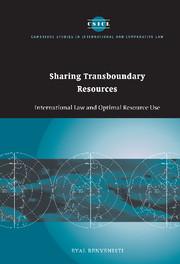Book contents
- Frontmatter
- Contents
- Acknowledgments
- Table of cases
- List of abbreviations
- 1 Introduction
- 2 The need for collective action in the management of transboundary resources
- 3 States as collective actors
- 4 The transnational conflict paradigm: structural failures and responses
- 5 Transnational institutions for transboundary ecosystem management: defining the tasks and the constraints
- 6 The structure and procedure of institutions for transboundary ecosystem management
- 7 The development of positive international law on transboundary ecosystems: a critical analysis
- 8 Efficiency, custom, and the evolution of international law on transboundary resources
- 9 Conclusion
- Bibliograhy
- Index
- CAMBRIDGE STUDIES IN INTERNATIONAL AND COMPARATIVE LAW
4 - The transnational conflict paradigm: structural failures and responses
Published online by Cambridge University Press: 14 July 2009
- Frontmatter
- Contents
- Acknowledgments
- Table of cases
- List of abbreviations
- 1 Introduction
- 2 The need for collective action in the management of transboundary resources
- 3 States as collective actors
- 4 The transnational conflict paradigm: structural failures and responses
- 5 Transnational institutions for transboundary ecosystem management: defining the tasks and the constraints
- 6 The structure and procedure of institutions for transboundary ecosystem management
- 7 The development of positive international law on transboundary ecosystems: a critical analysis
- 8 Efficiency, custom, and the evolution of international law on transboundary resources
- 9 Conclusion
- Bibliograhy
- Index
- CAMBRIDGE STUDIES IN INTERNATIONAL AND COMPARATIVE LAW
Summary
The systemic failures of Westphalia
This chapter explores the systemic reasons for the relative edge that small interest groups have over larger interest groups in influencing domestic decision making and international negotiations, including decisions concerning the management of transboundary resources. This first part outlines the relevant norms, procedures, and institutions – both domestic and international – that together sustain small-group influence. Based on this analysis, the second part then suggests modalities for reducing the domination of these groups and enhancing the prospects of positive cooperation among all interested groups.
The edge that small groups enjoy in relation to the management of transboundary resources stems from the fact that the adoption processes for policies relating to resources not solely under the control of a single polity are customarily less transparent than adoption policies for wholly domestic matters. The less transparent the decision-making procedures, the greater the opportunities for the executive to camouflage its concession to interest groups. The management of transboundary resources involves treaties rather than domestic prescriptions. The negotiation, implementation, and enforcement of treaties provide vast opportunities for executive slack and, hence, for interest group gains.
Treaty negotiation and ratification
As suggested by Robert Putnam, international negotiations are structured like a two-level game: a simultaneous game played by government representatives at the international level with representatives of foreign governments and at the national level with representatives of domestic interest groups. But the fact that governments play the game does not necessarily imply that they actually control its outcome.
- Type
- Chapter
- Information
- Sharing Transboundary ResourcesInternational Law and Optimal Resource Use, pp. 64 - 100Publisher: Cambridge University PressPrint publication year: 2002



